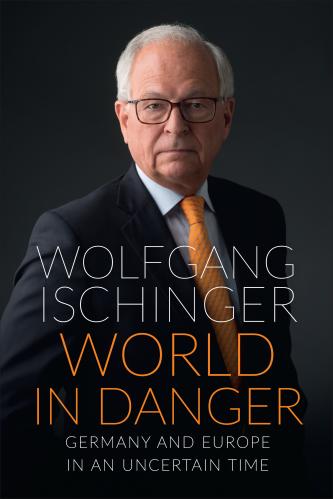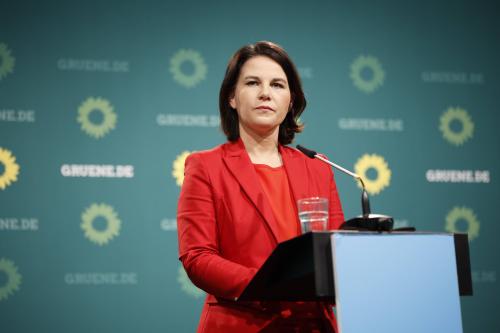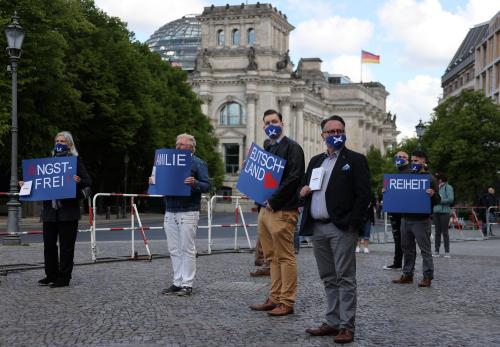As regional elections in Saxony-Anhalt approach, the Christian Democrats face a difficult balancing act between its centrist, liberal leadership and more right-wing elements in Germany’s east, writes Constanze Stelzenmüller. This post originally appeared in the Financial Times.
“The future’s in the air, can feel it everywhere, blowing with the wind of change,” the West German rock band Scorpions roared in 1991, clad in tight black leather from head to toe. Their ballad was a global hit the year after German unification, coming just in time for the demise of the Soviet Union. It came to epitomise the end of the cold war, and the hope that democratic revolutions would ripple around the world.
Three decades later, German politicians have learnt to be jumpy about winds of change, especially when they blow from the five Länder that once made up communist East Germany. So the fact that the small state of Saxony-Anhalt holds a bellwether election on Sunday — the last state poll before the national vote on September 26 — is causing some headaches in Berlin. And not just because the far-right Alternative for Germany, which calls itself the standard-bearer of a new people’s rebellion, captured a quarter of the vote in the state’s 2016 election.
The latest survey suggests that the state’s popular premier Rainer Haseloff doesn’t have much to worry about: 68% of those polled want him to stay in office. His Christian Democrats lead with 29%, with the AfD on 23%. But 45% say they haven’t made up their minds yet, and that has sent Armin Laschet, the CDU leader and chancellor Angela Merkel’s would-be successor, scurrying to Saxony-Anhalt to shore things up.
Laschet, a dyed-in-the-wool supporter of Merkel’s liberal centrism, has reason to be vigilant. In February 2020, a recalcitrant state branch of his party in Thuringia agreed to elect an unknown politician as premier with the AfD’s support, despite a strict non-cooperation order from the national CDU leadership. Laschet’s predecessor, defence minister Annegret Kramp-Karrenbauer, was forced to resign as party leader. Briefly, it seemed as though Merkel’s government itself might topple.
The politics of Saxony-Anhalt — it has Germany’s largest number of world heritage sites but its lowest gross domestic product per head — are no less stroppy. In December, its Christian Democrats caused chaos by blocking an 86-cent annual fee increase for Germany’s public broadcasters. Haseloff had to sack his interior minister for suggesting a minority government tolerated by the AfD, whose local leaders are among the most shrill and extremist in Germany.
Yet Laschet’s troubles won’t be over if Haseloff wins the election. The CDU is in a bind in eastern Germany. This is where the AfD is strongest, and the post-communist Linke party still has traction there, too. But the CDU excludes cooperation with both. In Saxony-Anhalt, Haseloff’s ultra-conservative local chapter had to submit resentfully to a “Kenya” coalition: CDU (black), Social Democrats, (red) and Greens.
The survey suggests that Sunday’s election offers at least three options: a repeat of “Kenya” (rejected by two-thirds of those surveyed), “Jamaica” with the CDU, Free Democrats (yellow), and Greens (rejected by a majority), or the preferred “Germany” (CDU, SPD, and FDP). Haseloff might even be staring at a four-way “Zimbabwe” combo of CDU, SPD, FDP, and Greens.
Messy coalition negotiations, a local CDU revolt egged on by the AfD or even an unexpectedly good result for the AfD: any of these could undermine Laschet. But he has bigger worries.
At federal level, the AfD is stuck at 12% in the polls, not least because it is firmly in the grip of its most radical wing. Its only path to national power is a cooptation of the CDU from within. So even CDU conservatives were alarmed last weekend when the WerteUnion, a small informal grouping on the party’s outer right flank, elected a new chairman: Max Otte, notorious for his affinity with the AfD.
Even worse, Hans-Georg Maassen, Germany’s former domestic spy chief and another darling of the right, is running for a CDU seat in Thuringia. Maassen calls the Greens, Laschet’s dream coalition partner, “neo-socialist” and “dangerous.” An essay co-authored by him in a German “new right” magazine paints a dystopian picture of leftwing “globalists” siphoning off the world’s wealth, uncontrolled immigration and civil wars: language indistinguishable from that of the AfD.
All this has finally stirred calls in the CDU’s eastern chapters to draw a hard line against the extremists within. And none too soon if it wants to avoid the fate of the GOP in the U.S. Also, it risks centrist voters deserting en masse to the Greens and FDP. In that scenario, Germany could end up with a Green chancellor leading a coalition without the CDU. That really would be a revolution.
The Brookings Institution is committed to quality, independence, and impact.
We are supported by a diverse array of funders. In line with our values and policies, each Brookings publication represents the sole views of its author(s).











Commentary
East German political winds ruffle feathers in Berlin
June 1, 2021